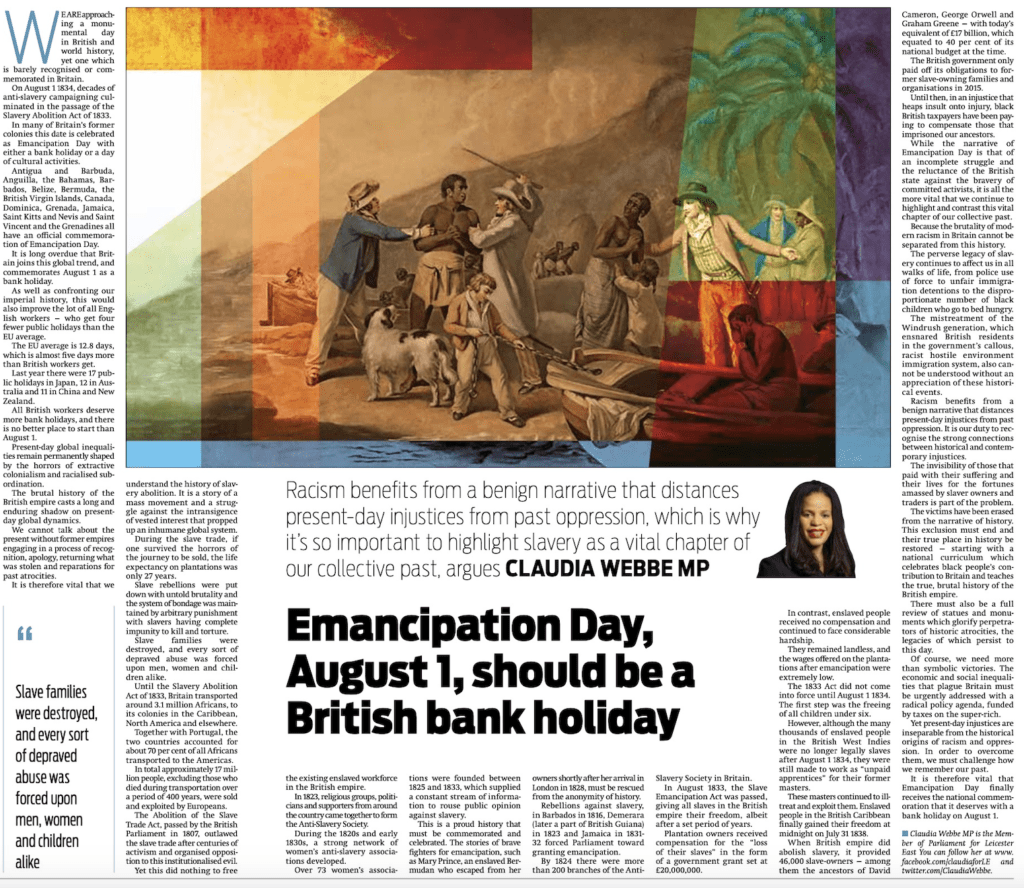
Emancipation Day, August 1, should be an official British bank holiday
By Claudia Webbe MP
Racism benefits from a benign narrative that distances present-day injustices from past oppression, which is why it’s so important to highlight slavery as a vital chapter of our collective past, argues CLAUDIA WEBBE MP
WE ARE approaching a monumental day in British and world history, yet one which is barely recognised or commemorated in Britain.
On August 1 1834, decades of anti-slavery campaigning culminated in the passage of the Slavery Abolition Act of 1833.
In many of Britain’s former colonies this date is celebrated as Emancipation Day with either a bank holiday or a day of cultural activities.
Antigua and Barbuda, Anguilla, the Bahamas, Barbados, Belize, Bermuda, the British Virgin Islands, Canada, Dominica, Grenada, Jamaica, Saint Kitts and Nevis and Saint Vincent and the Grenadines all have an official commemoration of Emancipation Day.
It is long overdue that Britain joins this global trend, and commemorates August 1 as a bank holiday.
As well as confronting our imperial history, this would also improve the lot of all English workers — who get four fewer public holidays than the EU average.
The EU average is 12.8 days, which is almost five days more than British workers get.
Last year there were 17 public holidays in Japan, 12 in Australia and 11 in China and New Zealand.
All British workers deserve more bank holidays, and there is no better place to start than August 1.
Present-day global inequalities remain permanently shaped by the horrors of extractive colonialism and racialised subordination.
The brutal history of the British empire casts a long and enduring shadow on present-day global dynamics.
We cannot talk about the present without former empires engaging in a process of recognition, apology, returning what was stolen and reparations for past atrocities.
It is therefore vital that we understand the history of slavery abolition. It is a story of a mass movement and a struggle against the intransigence of vested interest that propped up an inhumane global system.
During the slave trade, if one survived the horrors of the journey to be sold, the life expectancy on plantations was only 27 years.
Slave rebellions were put down with untold brutality and the system of bondage was maintained by arbitrary punishment with slavers having complete impunity to kill and torture.
Slave families were destroyed, and every sort of depraved abuse was forced upon men, women and children alike.
Until the Slavery Abolition Act of 1833, Britain transported around 3.1 million Africans, to its colonies in the Caribbean, North America and elsewhere.
Together with Portugal, the two countries accounted for about 70 per cent of all Africans transported to the Americas.
In total approximately 17 million people, excluding those who died during transportation over a period of 400 years, were sold and exploited by Europeans.
The Abolition of the Slave Trade Act, passed by the British Parliament in 1807, outlawed the slave trade after centuries of activism and organised opposition to this institutionalised evil.
Yet this did nothing to free the existing enslaved workforce in the British empire.
In 1823, religious groups, politicians and supporters from around the country came together to form the Anti-Slavery Society.
During the 1820s and early 1830s, a strong network of women’s anti-slavery associations developed.
Over 73 women’s associations were founded between 1825 and 1833, which supplied a constant stream of information to rouse public opinion against slavery.
This is a proud history that must be commemorated and celebrated. The stories of brave fighters for emancipation, such as Mary Prince, an enslaved Bermudan who escaped from her owners shortly after her arrival in London in 1828, must be rescued from the anonymity of history.
Rebellions against slavery, in Barbados in 1816, Demerara (later a part of British Guiana) in 1823 and Jamaica in 1831-32 forced Parliament toward granting emancipation.
By 1824 there were more than 200 branches of the Anti-Slavery Society in Britain.
In August 1833, the Slave Emancipation Act was passed, giving all slaves in the British empire their freedom, albeit after a set period of years.
Plantation owners received compensation for the “loss of their slaves” in the form of a government grant set at £20,000,000.
In contrast, enslaved people received no compensation and continued to face considerable hardship.
They remained landless, and the wages offered on the plantations after emancipation were extremely low.
The 1833 Act did not come into force until August 1 1834. The first step was the freeing of all children under six.
However, although the many thousands of enslaved people in the British West Indies were no longer legally slaves after August 1 1834, they were still made to work as “unpaid apprentices” for their former masters.
These masters continued to ill-treat and exploit them. Enslaved people in the British Caribbean finally gained their freedom at midnight on July 31 1838.
When British empire did abolish slavery, it provided 46,000 slave-owners — among them the ancestors of David Cameron, George Orwell and Graham Greene — with today’s equivalent of £17 billion, which equated to 40 per cent of its national budget at the time.
The British government only paid off its obligations to former slave-owning families and organisations in 2015.
Until then, in an injustice that heaps insult onto injury, black British taxpayers have been paying to compensate those that imprisoned our ancestors.
While the narrative of Emancipation Day is that of an incomplete struggle and the reluctance of the British state against the bravery of committed activists, it is all the more vital that we continue to highlight and contrast this vital chapter of our collective past.
Because the brutality of modern racism in Britain cannot be separated from this history.
The perverse legacy of slavery continues to affect us in all walks of life, from police use of force to unfair immigration detentions to the disproportionate number of black children who go to bed hungry.
The mistreatment of the Windrush generation, which ensnared British residents in the government’s callous, racist hostile environment immigration system, also cannot be understood without an appreciation of these historical events.
Racism benefits from a benign narrative that distances present-day injustices from past oppression. It is our duty to recognise the strong connections between historical and contemporary injustices.
The invisibility of those that paid with their suffering and their lives for the fortunes amassed by slaver owners and traders is part of the problem.
The victims have been erased from the narrative of history. This exclusion must end and their true place in history be restored — starting with a national curriculum which celebrates black people’s contribution to Britain and teaches the true, brutal history of the British empire.
There must also be a full review of statues and monuments which glorify perpetrators of historic atrocities, the legacies of which persist to this day.
Of course, we need more than symbolic victories. The economic and social inequalities that plague Britain must be urgently addressed with a radical policy agenda, funded by taxes on the super-rich.
Yet present-day injustices are inseparable from the historical origins of racism and oppression. In order to overcome them, we must challenge how we remember our past.
It is therefore vital that Emancipation Day finally receives the national commemoration that it deserves with a bank holiday on August 1.
Claudia Webbe MP is the member of Parliament for Leicester East. You can follow her at www.facebook.com/claudiaforLE and twitter.com/ClaudiaWebbe


